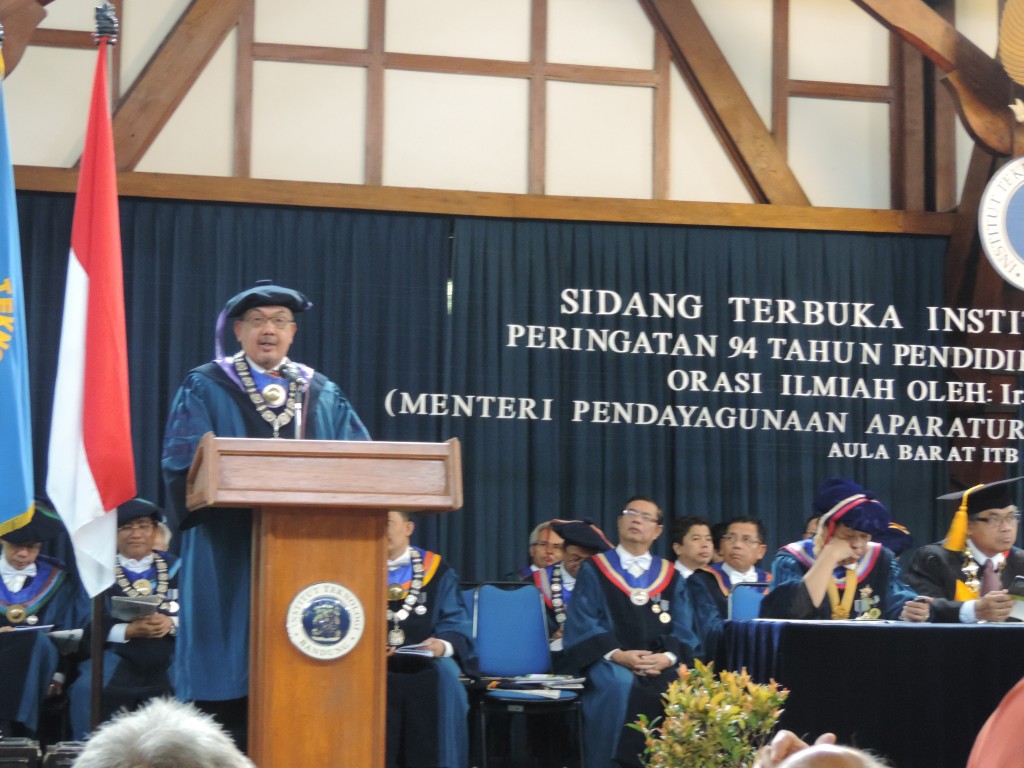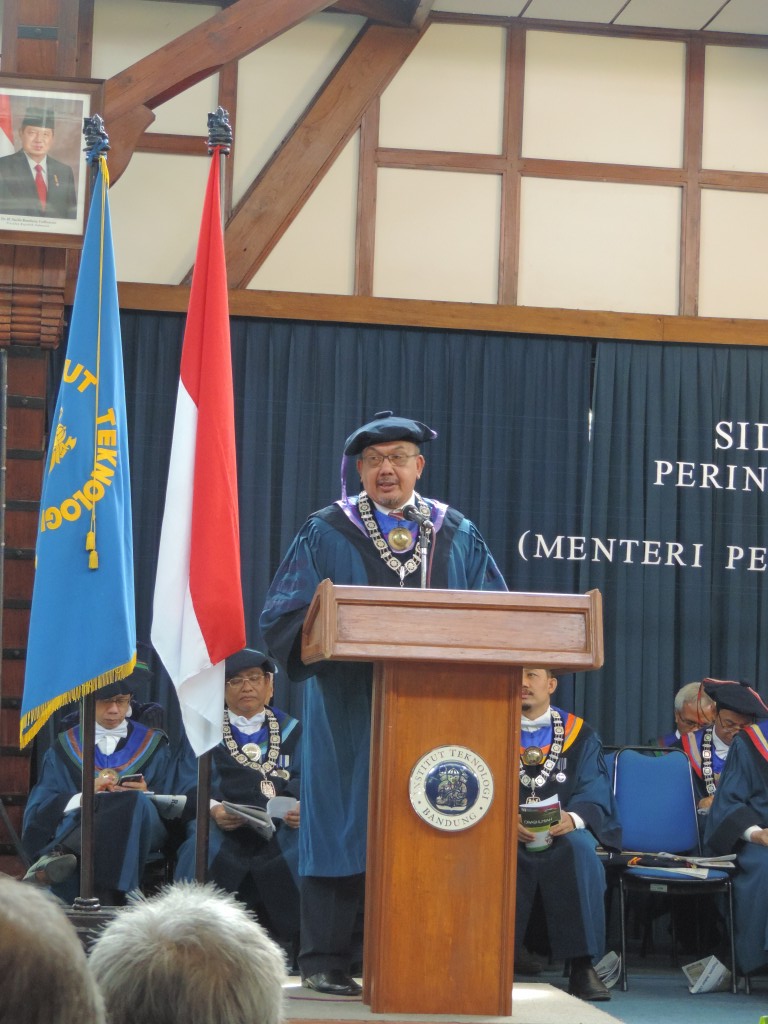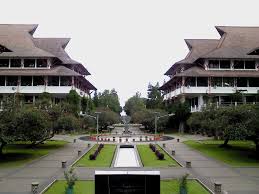Azwar Abubakar: The Importance of Bureaucracy Reform For The Indonesian Nation Quality

 BANDUNG, itb.ac.id - In order to provide long-term development vision 2005-2025 principled independent, forward, just, and prosperous, at present Indonesia is in the stage of National Medium-Term Development Plan (about) as the third stage to provide Indonesia development for year 2015-2019 with the goal to strengthen overall development by pressing development on competitive advantage, quality, and technology. The third RPJMN stage is considered capable of pushing Indonesia to increase the prosperity of the nation. Embodiments of the plan was bolstered by the World Economic Forum survey results stating that Indonesia's position in the country is increasing ease of doing business ranking from position 55 to 38 in 2013. This encourages investors to invest for the development of Indonesia. However, the implementation is still hampered by Indonesian bureaucracy that still does not work effectively, and efficiently.
BANDUNG, itb.ac.id - In order to provide long-term development vision 2005-2025 principled independent, forward, just, and prosperous, at present Indonesia is in the stage of National Medium-Term Development Plan (about) as the third stage to provide Indonesia development for year 2015-2019 with the goal to strengthen overall development by pressing development on competitive advantage, quality, and technology. The third RPJMN stage is considered capable of pushing Indonesia to increase the prosperity of the nation. Embodiments of the plan was bolstered by the World Economic Forum survey results stating that Indonesia's position in the country is increasing ease of doing business ranking from position 55 to 38 in 2013. This encourages investors to invest for the development of Indonesia. However, the implementation is still hampered by Indonesian bureaucracy that still does not work effectively, and efficiently. A follow-up to this, the Minister of State Apparatus Utilization and Bureaucratic Reform of the Republic of Indonesia (Minister of PAN-Wed), Dr. Ir. Azwar Abubakar, MM. , delivered his opinion on the Indonesian bureaucracy through scientific oration in ITB Open Session. This event held to commemorate the Higher Technical Education in Indonesia to 94. The session was held on Thursday (07/03/14), located in the West Hall ITB.
The Bureaucracy in Indonesia
Indonesian bureaucracy has a position and strategic role, especially for the process of community empowerment. The system is not yet working effectively in realizing the ministry premises in various aspects, such as education, health, basic administration, and others. The problems related to bureaucracy clearly shown by the high level of corruption, poor public services, and the lack of accountability of the organization's performance. According to Anwar Abubakar, there are four main causes of the low quality of the bureaucracy is the bottleneck in Indonesia, namely legislation, organization, Human Resources (HR), and government management. Some laws still are overlapping, and the obscurity in the field of the state apparatus. In addition, many laws that haven't been adjusted rule the dynamic changes the government and community demands. "There are so many local regulations which was not in accordance with rules and laws in the central level. Needs a reexamination to solve this case," said Azwar Abubakar.
Some laws still are overlapping, and the obscurity in the field of the state apparatus. In addition, many laws that haven't been adjusted rule the dynamic changes the government and community demands. "There are so many local regulations which was not in accordance with rules and laws in the central level. Needs a reexamination to solve this case," said Azwar Abubakar.
Government management is still focus on the input, while the results of the performance has not been thoroughly considered. This is evident from the performance of government accountability is low. This condition causes the ineffectiveness of the work. To establish a quality management, of course driven by qualified human resources as well. Human resource management has not implemented optimally to improve the professionalism, employee performance, and organization. This is due to the recruitment process that is not appropriate, so that the results are not as expected. This condition causes the public disenchantment against the existing bureaucracy.
The Importance of Bureaucratic Reform
 The transformation of the bureaucratic system is seen as an important driving factor in the development of a country, even for countries that have advanced though, which is a bureaucratic reform process there is no ending. This is because the demands of the strategic environment, such as the development of information technology, communications, globalization, in line with the dynamics of the community, and improving the competitiveness of the nation. The importance of these reforms also based on the fact the success of development in some countries, such as Korea and China. Both countries have sought full repair system of government, as well as the culture of bureaucracy, so that both countries are now considered to have strong competitiveness globally, particularly in the economic field.
The transformation of the bureaucratic system is seen as an important driving factor in the development of a country, even for countries that have advanced though, which is a bureaucratic reform process there is no ending. This is because the demands of the strategic environment, such as the development of information technology, communications, globalization, in line with the dynamics of the community, and improving the competitiveness of the nation. The importance of these reforms also based on the fact the success of development in some countries, such as Korea and China. Both countries have sought full repair system of government, as well as the culture of bureaucracy, so that both countries are now considered to have strong competitiveness globally, particularly in the economic field.
Benefits of bureaucratic reform will have a direct impact on improving the quality of public policies based on the real conditions in the field (evidence based), lack of transparency for the public welfare, as well as improving the quality of public services. This bureaucratic reforms would encourage the implementation of overall development in Indonesia, particularly in implementing the RPJMN currently implemented. In addition, implementation of the reform of the bureaucracy rated will also invite investors to participate neglected to invest for the betterment of this nation.
The ITB's Role In Indonesia Bureaucratic Reform
 Bureaucratic reform in Indonesia can be achieved with the support of all stakeholders and Higher Education is one of the mainstay to make it happen. As a pioneer of engineering science in Indonesia, ITB considered to have a reputation of being competent to encourage these changes. Through the Open Session, Azwar Abubakar asserted that ITB is able to take a role in supporting the development of qualifications, competence, and capability of human resources challenge in facing the future. "I believe that ITB will seek to change the system so that it can lead to a better direction," Anwar Abubakar added before closing his speech.
Bureaucratic reform in Indonesia can be achieved with the support of all stakeholders and Higher Education is one of the mainstay to make it happen. As a pioneer of engineering science in Indonesia, ITB considered to have a reputation of being competent to encourage these changes. Through the Open Session, Azwar Abubakar asserted that ITB is able to take a role in supporting the development of qualifications, competence, and capability of human resources challenge in facing the future. "I believe that ITB will seek to change the system so that it can lead to a better direction," Anwar Abubakar added before closing his speech.
Photo source: private documentation and www.jakpro.id .

scan for download







